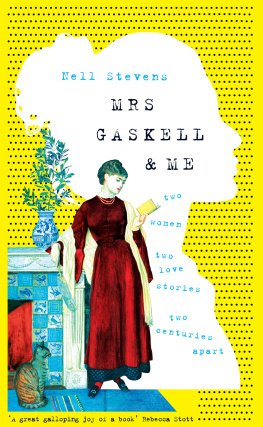LIBBIE MARSH'S THREE ERAS
BY ELIZABETH GASKELL
Last November but one, there was a flitting in our neighbourhood; hardly a flitting, after all, for it was only a single person changing her place of abode from one lodging to another; and instead of a cartload of drawers and baskets, dressers and beds, with old king clock at the top of all, it was only one large wooden chest to be carried after the girl, who moved slowly and heavily along the streets, listless and depressed, more from the state of her mind than of her body. It was Libbie Marsh, who had been obliged to quit her room in Dean Street, because the acquaintances whom she had been living with were leaving Manchester. She tried to think herself fortunate in having met with lodgings rather more out of the town, and with those who were known to be respectable; she did indeed try to be contented, but in spite of her reason, the old feeling of desolation came over her, as she was now about to be thrown again entirely among strangers.
No. 2, Court, Albemarle Street, was reached at last, and the pace, slow as it was, slackened as she drew near the spot where she was to be left by the man who carried her box, for, trivial as her acquaintance with him was, he was not quite a stranger, as every one else was, peering out of their open doors, and satisfying themselves it was only "Dixon's new lodger."
Dixon's house was the last on the left-hand side of the court. A high dead brick wall connected it with its opposite neighbour. All the dwellings were of the same monotonous pattern, and one side of the court looked at its exact likeness opposite, as if it were seeing itself in a looking-glass.
Dixon's house was shut up, and the key left next door; but the woman in whose charge it was left knew that Libbie was expected, and came forward to say a few explanatory words, to unlock the door, and stir the dull grey ashes that were lazily burning in the grate: and then she returned to her own house, leaving poor Libbie standing alone with the great big chest in the middle of the house-place floor, with no one to say a word to (even a common-place remark would have been better than this dull silence), that could help her to repel the fast-coming tears.
Dixon and his wife, and their eldest girl, worked in factories, and were absent all day from the house: the youngest child, also a little girl, was boarded out on the week-days at the neighbour's where the door-key was deposited, but although busy making dirt-pies, at the entrance to the court, when Libbie came in, she was too young to care much about her parents' new lodger. Libbie knew that she was to sleep with the elder girl in the front bedroom, but, as you may fancy, it seemed a liberty even to go upstairs to take off her things, when no one was at home to marshal the way up the ladder-like steps. So she could only take off her bonnet, and sit down, and gaze at the now blazing fire, and think sadly on the past, and on the lonely creature she was in this wide worldfather and mother gone, her little brother long since deadhe would been more than nineteen had he been alive, but she only thought of him as the darling baby; her only friends (to call friends) living far away at their new house; her employers, kind enough people in their way, but too rapidly twirling round on this bustling earth to have leisure to think of the little work-woman, excepting when they wanted gowns turned, carpets mended, or household linen darned; and hardly even the natural though hidden hope of a young girl's heart, to cheer her on with the bright visions of a home of her own at some future day, where, loving and beloved, she might fulfil a woman's dearest duties.
For Libbie was very plain, as she had known so long that the consciousness of it had ceased to mortify her. You can hardly live in Manchester without having some idea of your personal appearance: the factory lads and lasses take good care of that; and if you meet them at the hours when they are pouring out of the mills, you are sure to hear a good number of truths, some of them combined with such a spirit of impudent fun, that you can scarcely keep from laughing, even at the joke against yourself. Libbie had often and often been greeted by such questions as"How long is it since you were a beauty?" "What would you take a day to stand in the fields to scare away the birds?" &c., for her to linger under any impression as to her looks.
While she was thus musing, and quietly crying, under the pictures her fancy had conjured up, the Dixons came dropping in, and surprised her with her wet cheeks and quivering lips.
She almost wished to have the stillness again that had so oppressed her an hour ago, they talked and laughed so loudly and so much, and bustled about so noisily over everything they did. Dixon took hold of one iron handle of her box, and helped her to bump it upstairs, while his daughter Anne followed to see the unpacking, and what sort of clothes "little sewing body had gotten." Mrs. Dixon rattled out her tea-things, and put the kettle on, fetched home her youngest child, which added to the commotion. Then she called Anne downstairs, and sent her for this thing and that: eggs to put to the cream, it was so thin; ham, to give a relish to the bread and butter; some new bread, hot, if she could get it. Libbie heard all these orders, given at full pitch of Mrs. Dixon's voice, and wondered at their extravagance, so different from the habits of the place where she had last lodged. But they were fine spinners, in the receipt of good wages; and confined all day in an atmosphere ranging from seventy-five to eighty degrees. They had lost all natural, healthy appetite for simple food, and, having no higher tastes, found their greatest enjoyment in their luxurious meals.
When tea was ready, Libbie was called downstairs, with a rough but hearty invitation, to share their meal; she sat mutely at the corner of the tea-table, while they went on with their own conversation about people and things she knew nothing about, till at length she ventured to ask for a candle, to go and finish her unpacking before bedtime, as she had to go out sewing for several succeeding days. But once in the comparative peace of her bedroom, her energy failed her, and she contented herself with locking her Noah's ark of a chest, and put out her candle, and went to sit by the window, and gaze out at the bright heavens; for ever and ever "the blue sky, that bends over all," sheds down a feeling of sympathy with the sorrowful at the solemn hours when the ceaseless stars are seen to pace its depths.
By-and-by her eye fell down to gazing at the corresponding window to her own, on the opposite side of the court. It was lighted, but the blind was drawn down: upon the blind she saw, first unconsciously, the constant weary motion of a little spectral shadow, a child's hand and armno more; long, thin fingers hanging down from the wrist, while the arm moved up and down, as if keeping time to the heavy pulses of dull pain. She could not help hoping that sleep would soon come to still that incessant, feeble motion: and now and then it did cease, as if the little creature had dropped into a slumber from very weariness; but presently the arm jerked up with the fingers clenched, as if with a sudden start of agony. When Anne came up to bed, Libbie was still sitting, watching the shadow, and she directly asked to whom it belonged.
"It will be Margaret Hall's lad. Last summer, when it was so hot, there was no biding with the window shut at night, and theirs was open too: and many's the time he has waked me with his moans; they say he's been better sin' cold weather came."
"Is he always in bed? Whatten ails him?" asked Libbie.
"Summat's amiss wi' his backbone, folks say; he's better and worse, like. He's a nice little chap enough, and his mother's not that bad either; only my mother and her had words, so now we don't speak."







